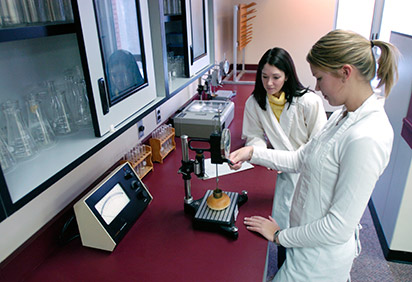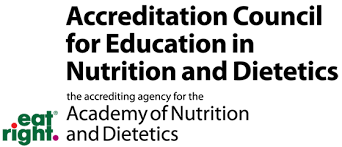 TOOLS OF THE TRADE: You'll get hands-on experience with equipment used in the dietetics field to prepare you for what you'll encounter in your career.
TOOLS OF THE TRADE: You'll get hands-on experience with equipment used in the dietetics field to prepare you for what you'll encounter in your career.
Prepare for abundant career choices in healthcare
As a nutrition major pursuing the dietetics track at IUP, you'll take a balanced blend of outstanding courses and gain a strong foundation for a career as a dietitian.
The dietetics track educates professionals in how to translate food and nutrition science information for diverse members of society. The undergraduate dietetic curriculum results in a bachelor of science in nutrition and prepares you for a variety of career opportunities in healthcare, food service administration, the food industry, public health, community education, culinary dietetics, and food and nutrition research.
Among the classes you'll take are topics such as nutrition and disease, careers in food and nutrition, experimental foods, food consumption patterns, nutrition counseling, hospitality purchasing, and principles of management. The completion of the dietetic program prepares students to apply for an Accreditation Council for Education in Nutrition and Dietetics (ACEND) accredited supervised practice program en route to becoming a registered dietitian, including IUP's Master of Science in Food and Nutrition, Dietitian-Nutritionist Program.
Over the past 30 years, IUP's Food and Nutrition Department has educated more than 1,000 dietitians and nutritionists.
You can gain valuable experience through programs such as Nutrition Connection, a peer nutrition counseling service operated by the Department of Food and Nutrition and housed in the Center for Health and Well-Being. Nutrition Connection is staffed by undergraduate students enrolled in FDNT 465 Nutrition Counseling and Education.
Students participate in interdisciplinary simulations with the nursing and the speech-language pathology programs when enrolled in FDNT 355 and 455 Medical Nutrition Therapy.
IUP's Food and Nutrition Department also has an active student organization, the Student Association of Nutrition and Dietetics (SAND), where undergraduate students gain experience in leadership, nutrition community education, and nutrition programming and meet others who are in their major.
Graduates of the Dietetics Track will:
-
Have in-depth knowledge of food, nutrition, and behavioral sciences.
-
Acquire the ability to apply these theories utilizing problem-solving and critical-thinking skills to improve the quantity and quality of food and nutrition for people now and in the future
-
Understand relationships among academic disciplines (i.e., the natural sciences, including chemistry, physiology, and biochemistry) and apply these scientific principles to the practice of nutrition and dietetics
-
Translate the role of nutrients and healthy food preparation for health and well-being
-
Provide effective nutrition education to individuals and groups
-
Know the roles, responsibilities, and competencies needed by therapeutic, administrative, and community dietitians
-
Exhibit leadership and team-building skills
-
Understand science and technology in order to perform effectively in the workplace and as citizens in a world increasingly shaped by technology and faced with social dilemmas stemming from scientific advances
-
Utilize appropriate technologies within the discipline
-
Think critically, communicate effectively both orally and in writing, analyze information, make decisions, and solve problems in a rapidly changing nation and world
-
Be able to work with diverse populations in a global economy
-
Continue in lifelong learning
-
Meet the basic requirements for graduate study in nutrition and related areas
Mission
The mission of the IUP Didactic Program in Dietetics is to provide superior educational opportunities combining theory and practice in an intellectually challenging and diverse environment to help prepare students for supervised practice leading to eligibility for the CDR credentialing exam to become a registered dietitian nutritionist.
Program Goals and Outcome Measures
Goal 1
Graduates will be prepared for entry into supervised practice, other post-graduate programs, or the food and nutrition-related workforce.
Goal 1 Objectives:
-
At least 80 percent of students complete program requirements within six years (150 percent of planned program length).
-
At least 50 percent of program graduates will apply for admission to a supervised practice program prior to or within 12 months of graduation.
-
Of program graduates who apply to a supervised practice program, at least 50 percent will be admitted within 12 months of graduation.
-
The program's one-year pass rate (graduates who pass the registration exam within one year of first attempt) on the CDR credentialing exam for dietitian nutritionists is at least 80 percent.
-
At least 80 percent of dietetic supervised practice program directors or their designee will agree that the program graduate was prepared for their current assignment.
Goal 2
Goal 2 Objectives:
Graduates will be academically prepared for employment and/or graduate education in a food and nutrition or related field.
-
At least 80 percent of DPD graduates who respond to a survey within one year of graduation will agree that they were well-prepared for their current position in food and nutrition.
-
At least 80 percent of those who respond to a survey within one year of graduation who are currently in a graduate education program will agree that their undergraduate academic program prepared them for graduate school education in nutrition or a related field.
Program Outcomes Data
Complete outcomes data for the program are available upon request. Individuals may request this information from the DPD director, Nicole Clark, DCN, MS, RDN, LDN, CDCES, nclark@iup.edu.
Accreditation
The Indiana University of Pennsylvania DPD program has been granted accreditation by the Accreditation Council for Education in Nutrition and Dietetics (ACEND) of the Academy of Nutrition and Dietetics until June 30, 2029. The next accreditation review is scheduled for spring 2029.

ACEND may be contacted at:
Accreditation Council for Education in Nutrition and Dietetics
120 South Riverside Plaza
Suite 2190
Chicago, Illinois 60606-6995
Phone: 1-800-877-1600 Ext. 5400; 312-899-0040 Ext. 5400
Email: acend@eatright.org
ACEND exists to serve the public by establishing and enforcing eligibility requirements and accreditation standards that ensure the quality and continued improvement of nutrition and dietetics programs.
Graduation and Program Completion Requirements
Students in the Dietetics Track (DPD program) must complete all coursework outlined in the Dietetics curriculum sheet and based on IUP's graduation policies. Students are eligible for graduation once all courses have been successfully completed and the student has earned at least 120 credits, met the university's graduation requirements, and applied for graduation. Per university policy, students must complete their undergraduate degree in no more than six years.
Students who have earned an undergraduate degree in any major, and who would like to become a registered dietitian, are eligible to apply to the IUP Master of Science in Food and Nutrition Dietitian-Nutritionist program. Please contact Jodie Seybold for more information about this program at jseybold@iup.edu.
Academic and Program Calendar
The DPD program adheres to the academic calendar of Indiana University of Pennsylvania.
Contact Us
For additional information regarding the Indiana University of Pennsylvania Didactic Program, please contact:
Dr. Nicole A. Clark, DCN, MS, RDN, LDN, CDCES
Director of the Didactic Program in Dietetics
911 South Drive
Ackerman 102
Indiana, PA 15705
724-357-3128
nclark@iup.edu
 Uses Dietetics Knowledge to Help Babies Thrive
Uses Dietetics Knowledge to Help Babies Thrive